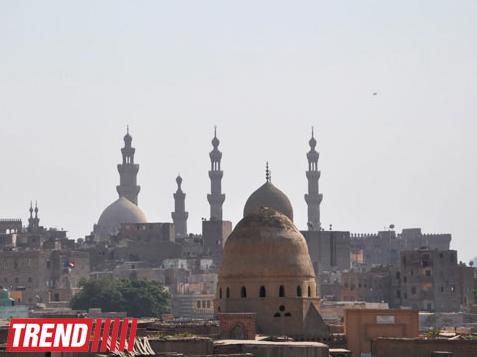Despite resuming some military aid, the United States appears unlikely to quickly restore the close ties with Egypt that framed U.S. Middle East policy for decades, as concerns persist over the authoritarian crackdown since last year's military takeover, Reuters reported.
Even as Egypt prepares for elections this month that could give new legitimacy to the country's military-backed leaders, many Obama administration officials question the need to restore Egypt to its place as the premier U.S. partner in the Arab world.
Washington's caution reflects a desire to help Egypt nip a mounting insurgency in the bud without being seen as sanctioning the interim government's repression of political opponents and the media.
The focus of bilateral aid, at least for the time being, is on confronting the militant threat and other security issues while U.S. officials assess how the country's next government responds to demands to halt the harsh treatment of dissent.
"Going back to the status quo of the past 30 years is not really an option that's available to us," a senior administration official said on condition of anonymity.
Egypt has been the second-largest recipient of U.S. foreign aid since its landmark peace treaty with Israel in 1979. But the policy was upended by the political transformations triggered by the 2011 popular uprising that toppled President Hosni Mubarak.
After the army last July ousted Mohamed Mursi, the Islamist leader elected after that uprising, Washington responded by freezing much of the annual $1.3 billion in military aid.
On April 22, the U.S. government relaxed its position and said it would provide $650 million in military financing, a move which required Secretary of State John Kerry to certify Egypt was maintaining its peace treaty with Israel. It also announced that it separately would send Egypt 10 U.S. Apache helicopters to help it fight insurgents.
Washington continues to withhold hundreds of millions of dollars more in aid, along with other hardware that Egypt had requested, including Harpoon missiles and fighter jets.
"Egypt is a very hard country to support right now, even in Washington among those who are strong defenders of the relationship," said Amy Hawthorne, a former State Department official now with the Atlantic Council, a Washington think tank.
"This recent aid decision is about getting parts of our relationship back on track - but it's far from a warm embrace."
Egypt has pursued a campaign against the Muslim Brotherhood, the Islamist party that propelled Mursi to power. Western officials have condemned mass death sentences for Muslim Brotherhood supporters as well as repression of other opposition parties and imprisonment of some journalists.
"The Obama administration wants to keep working with Egypt on regional security and counterterrorism - but at the same time it wants to send a message about the political transition and the need for greater respect for basic human rights," said Brian Katulis, an analyst at the Center for American Progress.
"In trying to split the difference between these two goals, the United States has sent an unclear message to Egyptians."
David Schenker, a former Pentagon official now at the Washington Institute for Near East Policy think-tank, said the Defense Department was eager to move America's strategic relationship with Egypt back to a more normal footing.
Egypt has been key to U.S. military activity in the region, allowing U.S. aircraft to fly over Egypt and facilitating U.S. ships' transit in the Suez Canal.
The timing of the decision last month to resume the $650 million in military financing was driven mainly by the U.S. government's need to make payments at the end of April to defense contractors who deliver military assistance to Egypt, U.S. officials said. The move was made in spite of worries about the direction the military-backed government has taken.
"They've taken steps whenever they've been forced to act for budget or programmatic reasons - but they really haven't taken any fundamental decisions about what U.S. policy on Egypt should be in the long-term," Katulis said.
U.S. officials hope that the Apaches will help Egypt fight militant groups based in Egypt's Sinai peninsula, including Ansar Bayt al-Maqdis. Egyptian officials say the groups have killed about 500 people in recent months.
General Abdel Fattah al-Sisi, who ousted Mursi and is widely expected to win next week's presidential vote, said in an interview with Reuters last week that the West risked letting militant groups in places like Egypt, Libya and Syria metastasize if it didn't act decisively to help fight them.
Last month, the White House announced it would designate Ansar Bayt al-Maqdis as a terrorist group, another move welcomed by Egypt's military-backed government.
Robert Springborg, an Egypt expert at the department of war studies at King's College in London, said that a U.S. focus on counterterrorism could suit Sisi.
He had signaled since becoming defense minister in 2012 that Egypt needed weaponry suited for fighting insurgents rather than high-end arms like jets, which are more useful in a ground war and which had been sought for decades by Mubarak.
State Department officials, including Secretary of State Kerry, appear to view U.S. ties to Egypt as increasingly important given the turmoil throughout the region, particularly in Syria, Iraq and Libya, Schenker said.
But Egypt's fierce crackdown on dissent is still impeding closer ties. "The White House is looking at this saying there are legitimate human rights concerns," Schenker said.
Where U.S. policy on Egypt is heading is "still being written," a senior U.S. military official said.
Even recently restored aid could ultimately be held up in Congress. On April 29, influential Senator Patrick Leahy said he would not approve the aid, denouncing death sentences that Egyptian courts have handed down for hundreds of Muslim Brotherhood supporters or other government opponents.






